22/52 Mistake: Edith Frances Jackson; 1867 - 1900
22/52 Mistake: Edith Frances Jackson; 1867 - 1900.
When I first started exploring my family history my father’s family, the Jacksons were one of the first families I investigated because I knew so little about them. My Jackson grandfather was dead before I was born and so I didn’t know him at all and my dad didn’t talk about his family. This grandfather was the subject of my first Family History Diploma subject, Introduction to Family History. Here I learned about using Ancestry and I subscribed because when the subject was over, I could’t live without it. Ancestry was a great gift. Among other things - like other people’s family trees - I was able to access the British Census and could follow the family over ten year intervals from 1841.
Here I learned that my grandfather was the youngest of a big tribe of sisters, my great aunts, who I had never heard of: Louisa, Edith, Florence, Emily and Gertrude. I was able to follow them from Hull, the birthplace of Louisa, Edith and Florence, to Sheffield where Emily, Gertrude and Frank, my grandfather, were born. The family were grocers and drapers. I have written about their mother Annie Eliza Jackson in the blog Maps. Here you can see modern google pictures of the houses where they lived in Sheffield. (https://sowheel.blogspot.com/2022/02/652-maps-annie-eliza-jackson.html)
Edith was the second child, born in Hull in 1867. They moved to Sheffield when she was still a toddler and she grew up in the grocery shop. Edith is in the 1871 Census, 3 years old in Nile Street, Sheffield; 1881, 13 years old at boarding school in Derbyshire, and 1891, 23 years old back at home in Sheffield. at Brumall’s Lane, working in the shop. In 1894, when she was 27, she married George Beeston.
The second subject I did in the Family History Diploma was Writing Family History. We were encouraged to write historical fiction and it got me thinking ‘suppose…’, ‘what if….’ I did this when I didn’t have the facts of a situation. When you are writing fiction, it’s ok to speculate and imagine what might have been. There was lots of scope for this with Edith Jackson.
For starters there was a lot to imagine about her at boarding school. She went to Renishaw Park boarding school and I had Jane Eyre in mind. You can find advertisements in the Sheffield papers: ‘Northwood House, Renishaw Park, near Cherster-field, splendid situation, every comfort, thorough English, with accomplishments, high class references; terms moderate and inclusive, pupils prepared for local examinations.’ They accepted day students as well as boarders and in 1881 there were eleven boarders between the ages of 18 and 9, all girls. Perhaps the older girls, 17 and 18, were ‘pupil governesses’. Edith was the only Jackson child who was sent to boarding school. Was that because she was especially bright? Or perhaps she was stroppy and undisciplined? As a grocer’s daughter was she looked down on by more upper class pupils? One could write quite the historical fiction about Edith at school.
Then Edith died when she was only 32 in 1900. Immediately I jumped to the conclusion that she must have died from childbirth. This was a mistake. When I wrote my first piece about the Jacksons I confidently stated this as the cause of her death. Of course it could have been many other things: tuberculosis, common infectious diseases like scarlet fever, cholera, measles, diphtheria. Life was dangerous. Many young people died.
At some stage in my family history journey I did my DNA and one of the best results from doing that was that I was contacted by my cousins Stephen and Anne Diver. They were descended from Edith’s sister, Emily. Anne, Emily’s granddaughter, was a passionate family historian who had done all her work without the internet. She doesn’t have an Ancestry account. She worked for British Rail and during her holidays she used free passage on the trains to travel all over England visiting records offices. Stephen, her nephew, was a generation closer to me and more internet savvy. They told me that Edith had died from suicide. She had killed herself with poison. That stopped me in my tracks.
Then I started to speculate on why she had been so unhappy. Was it because she was bullied at school?
For the purposes of exploring this mistake for this blog, I went back to researching Edith. I was reduced to searching on Ancestry for Edith’s husband to find out more about the woman. (Particularly telling was the sources for George Beeston in electoral rolls and to have it brought home that he had the vote but Edith didn’t.) I became very confused because although it seems an uncommon name, there were three or four men in Yorkshire and Lancashire called George Beeston. There was even an Edith Beeston buried in Manchester in 1900, the year that Edith died. And then a George Beeston buried in the same cemetery in 1909. I was almost convinced that this was them. Although I thought it was odd that she was listed as on the Sheffield Death Register but buried in Manchester.
I was about to make more mistakes with Edith and George when I remembered my cousins, Stephen and Anne Diver. I had the idea of looking at Stephen’s Ancestry entry for Edith. There all was revealed. There are some interesting notes. He says:
At the inquest her husband stated that they had quarrelled over his intention to work in South Africa as an ambulance man. She is buried in an unmarked grave in City Road Cemetery Sheffield.
Perhaps he was signing up for the Boer War?
I learned from Stephen’s Ancestry page that Edith and George had had a son in 1896, a child of four when his mother took her life. George Stanley Beeston grew up to join the Royal Navy at 15, only to be killed when he was only 20. His ship, HMS Hampshire, went down in 1916 off the Orkney Isles. In stormy weather they were carrying Lord Kitchener to talks with the Russian Tsar when there was an explosion. Of 749 on board only twelve survived. Not Lord Kitchener and not Able Seaman Beeston.
Edith and George’s lives were about as sad as you can get.
Imagining different scenarios in family history research is not exactly a ‘mistake’. It has its place. Introduction to Family History stressed the need to have three pieces of documentary evidence before you ever believed anything but in Writing Family History we learned to imagine and let our fancies have reign. Perhaps the way is the middle. It is certainly satisfying when you have been travelling down a particular line of speculation and new information comes to hand which sets you straight. In the Writing Family History unit students often expressed discomfort about ‘making things up’ and not sticking to the absolutely known facts, but I don’t regret any of my so called mistakes. May I go on to make many more.




Comments
Post a Comment